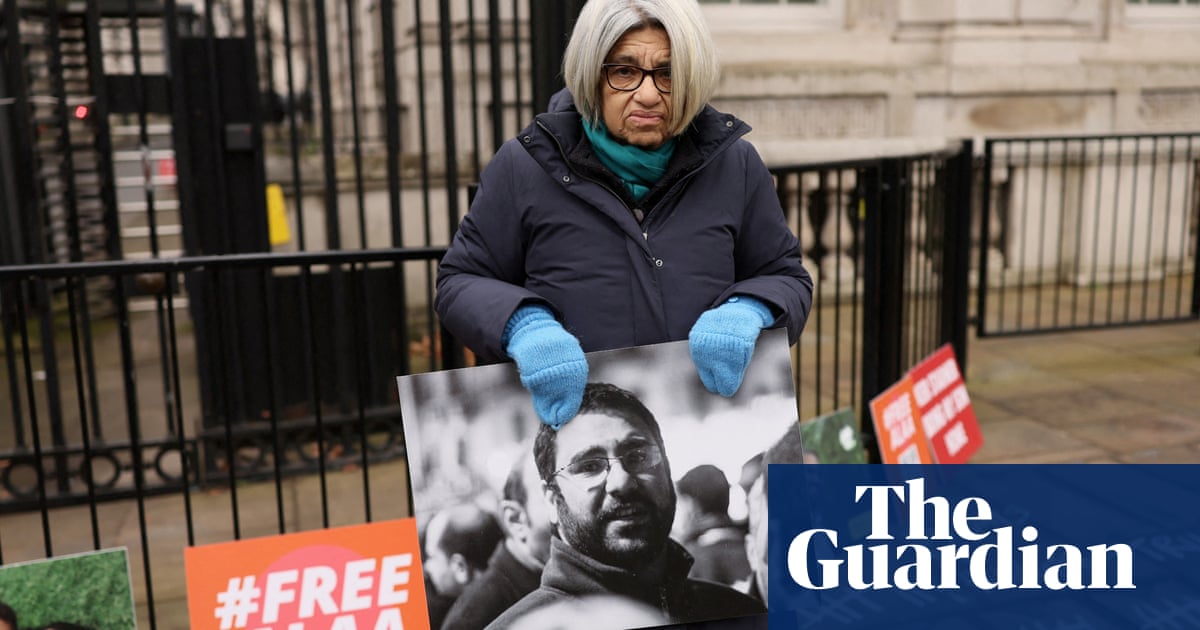The family of the imprisoned British-Egyptian activist Alaa Abd el-Fattah say they fear for his health along with that of his mother, Laila Soueif, as both continued their hunger strikes to demand his freedom.
Relatives of Soueif said they were worried she was “dying in slow motion” after eight monthson full or partial hunger strike. “What are we supposed to do, just sit around and wait to die?” said Soueif.
Fattah, who is in prison near Cairo, received medical treatment for vomiting and severe stomach pains earlier this week, after consuming nothing but herbal tea, black coffee and rehydration salts for more than 55 days.
He began a hunger strike on the day his mother was admitted to St Thomas’ hospital in London in February, almost 150 days into her own hunger strike, where she received a glucose drip intended to save her life.
Soueif started a hunger strike last September, after Fattah reached five years in prison – the length of his sentence – in the Wadi el-Natrun desert prison. The Egyptian authorities, who jailed him on terrorism charges for a social media post about torture, claim his sentence will end in January 2027.
“Alaa started his strike when he was notified that I’d gone into hospital. Now he’s sick, alone, in prison and we did not even know about it until he had been sick for a week. What more can we do?” said Soueif, who has grown increasingly desperate, saying that the British prime minister,Keir Starmer, is ignoring demands to free her son.
Fattah became a British citizen through Soueif in 2021 while incarcerated. His family had hoped that acquiring British citizenship would rapidly increase pressure on the Egyptian authorities to free the author, computer programmer and activist who is known as one of the Arab world’s most prominent prisoners of conscience.
Earlier this year, Soueif began a daily sit-in while on hunger strike at the gates of Downing Street in an attempt to pressure Starmer to speak directly with the Egyptian president,Abdel Fatah al-Sisi, and demand he free her son.
When her blood sugar dropped to dangerous levels after months without food, Soueif was hospitalised. She later met with Starmer in mid February.
The prime minister told parliament a week later that “I will do everything I can, to ensure the release in this case, and that includes phone calls as necessary. I’ve raised it before. I’ll raise it again. We raise it, and will continue to do so. I gave my word to the family that that’s what I’d do. That I will do, and I will.”
He spoke to Sisi on 28 February where he “pressed for Alaa’s release”,according to a Downing Street readoutof their call.
That conversation prompted Soueif to switch to a partial hunger strike of 300 calories per day, and she was discharged from hospital in early March. But in the two months since Starmer and Sisi spoke, there have been few signs of a shift from either government.
“I started taking some 300 calories a day when the prime minister and President Sisi talked. But that was two months ago now and nothing has happened,” said Soueif.
A spokesperson for the UK Foreign Office said that “securing the release of Mr el-Fattah remains an absolute priority, so that he can be reunited with his family. We continue to press for consular access.”
The UK foreign minister, David Lammy, spoke with his Egyptian counterpart on 9 April, they added.
Soueif’s nephew Omar Robert Hamilton said his aunt’s health was failing as she attempted to survive on a partial hunger strike. The 68-year-old activist and mathematics professor appears withered after months without real sustenance and is no longer able to stand upright.
“Three hundred calories a day is not enough to sustain life, her muscles are being eaten away,” he said. “It’s like she is dying in slow motion.”
